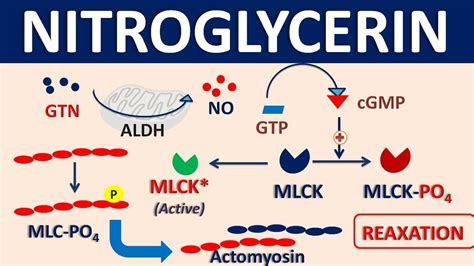Intro
Discover the 7 nitroglycerin side effects, including headaches, dizziness, and low blood pressure, and learn about medication interactions, dosage, and cardiovascular risks associated with this heart medication.
Nitroglycerin is a medication commonly used to treat angina, a condition characterized by chest pain or discomfort due to coronary heart disease. It works by relaxing and widening blood vessels to improve blood flow to the heart, thereby reducing the amount of oxygen the heart muscle needs. While nitroglycerin is effective in managing angina symptoms, it can cause several side effects. Understanding these side effects is crucial for patients to ensure safe and effective treatment.
Nitroglycerin has been a cornerstone in the management of angina for many years, offering quick relief from symptoms. However, like all medications, it is not without its drawbacks. The side effects of nitroglycerin can range from mild to severe and can affect various aspects of a patient's health. It is essential for individuals taking nitroglycerin to be aware of these potential side effects to manage them effectively and to seek medical help when necessary.
The importance of recognizing nitroglycerin side effects cannot be overstated. Not only can these side effects impact the quality of life, but in some cases, they can also indicate more serious health issues. By understanding what to expect and how to manage side effects, patients can work closely with their healthcare providers to optimize their treatment plan. This collaboration is key to achieving the best possible outcomes while minimizing the risks associated with nitroglycerin therapy.
Nitroglycerin Side Effects Overview

Nitroglycerin side effects can be categorized into common, less common, and rare but serious effects. Common side effects are experienced by many patients and are usually mild. These can include headache, dizziness, lightheadedness, and nausea. Less common side effects may affect fewer patients but can be more bothersome, including flushing, rash, and low blood pressure. Rare but serious side effects, such as severe allergic reactions, require immediate medical attention.
Common Side Effects of Nitroglycerin
The most frequently reported side effects of nitroglycerin are headaches, which can range from mild to severe. These headaches are thought to be caused by the dilation of blood vessels in the brain. Other common side effects include dizziness and lightheadedness, which can increase the risk of falls. Patients may also experience nausea and vomiting, although these are less common.Less Common Side Effects of Nitroglycerin

Less common side effects of nitroglycerin can include flushing and rash. Flushing is a result of the vasodilatory effects of nitroglycerin, leading to increased blood flow to the skin. A rash can be an allergic reaction to the medication. While these side effects are not experienced by the majority of patients, they can be bothersome and may require medical evaluation to rule out more serious conditions.
Rare but Serious Side Effects
Rare but serious side effects of nitroglycerin include severe allergic reactions, such as anaphylaxis, and methemoglobinemia, a condition where the amount of methemoglobin (a form of hemoglobin) in the blood is elevated. Methemoglobinemia can lead to symptoms such as shortness of breath, cyanosis (a condition characterized by a bluish discoloration of the skin and mucous membranes), and headache. These conditions require immediate medical attention.Managing Nitroglycerin Side Effects

Managing nitroglycerin side effects involves a combination of preventive measures, lifestyle adjustments, and, in some cases, medical interventions. Patients can reduce the risk of common side effects such as headaches and dizziness by taking the medication as directed and avoiding standing up too quickly. Staying hydrated and avoiding alcohol can also help minimize side effects. For more bothersome side effects, patients should consult their healthcare provider, who may adjust the dosage or recommend additional medications to alleviate symptoms.
Lifestyle Adjustments
Lifestyle adjustments play a significant role in managing nitroglycerin side effects. Patients are advised to make dietary changes, such as avoiding heavy meals and alcohol, which can exacerbate side effects. Regular physical activity, under the guidance of a healthcare provider, can also help improve overall cardiovascular health and reduce the severity of side effects.Nitroglycerin Interactions

Nitroglycerin can interact with other medications, including phosphodiesterase inhibitors (used to treat erectile dysfunction), certain antidepressants, and blood thinners. These interactions can lead to increased risk of side effects or reduced efficacy of nitroglycerin. Patients must inform their healthcare provider about all medications, including over-the-counter drugs and supplements, they are taking to avoid potential interactions.
Importance of Patient Education
Patient education is crucial in the management of nitroglycerin side effects. Patients should be well-informed about the potential side effects, how to manage them, and when to seek medical help. This education empowers patients to take an active role in their healthcare, ensuring they get the most out of their treatment plan while minimizing risks.Conclusion and Future Directions

In conclusion, while nitroglycerin is an effective medication for managing angina, its side effects can impact patients' quality of life. By understanding these side effects, taking preventive measures, and making lifestyle adjustments, patients can minimize their risks and maximize the benefits of nitroglycerin therapy. Future research should focus on developing new formulations or delivery systems that reduce side effects while maintaining or improving efficacy.
Final Thoughts
As with any medication, the key to successful nitroglycerin therapy is a thorough understanding of its benefits and risks. Patients should work closely with their healthcare providers to monitor side effects and adjust their treatment plan as needed. By doing so, individuals with angina can effectively manage their symptoms and improve their overall health and well-being.What are the most common side effects of nitroglycerin?
+The most common side effects of nitroglycerin include headaches, dizziness, and lightheadedness. These side effects are usually mild and temporary.
How can I minimize the risk of nitroglycerin side effects?
+To minimize the risk of side effects, take nitroglycerin as directed, avoid standing up too quickly, stay hydrated, and avoid alcohol. Regular physical activity and a balanced diet can also help.
Can I take nitroglycerin with other medications?
+It is essential to inform your healthcare provider about all medications you are taking, including over-the-counter drugs and supplements, to avoid potential interactions with nitroglycerin.
We hope this comprehensive overview of nitroglycerin side effects has been informative and helpful. If you have any further questions or would like to share your experiences with nitroglycerin, please feel free to comment below. Your insights can help others better understand and manage their treatment. Don't forget to share this article with anyone who might benefit from this information. Together, we can promote better health outcomes for individuals managing angina with nitroglycerin.
